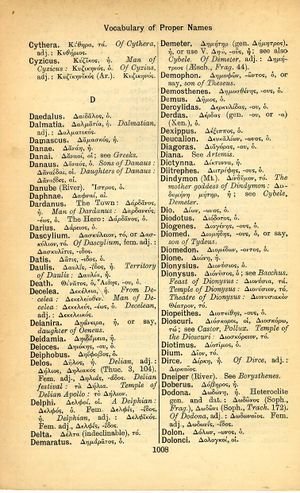Danae
καλῶς γέ μου τὸν υἱὸν ὦ Στιλβωνίδη εὑρὼν ἀπιόντ' ἀπὸ γυμνασίου λελουμένον οὐκ ἔκυσας, οὐ προσεῖπας, οὐ προσηγάγου, οὐκ ὠρχιπέδισας, ὢν ἐμοὶ πατρικὸς φίλος → Ah! Is this well done, Stilbonides? You met my son coming from the bath after the gymnasium and you neither spoke to him, nor kissed him, nor took him with you, nor ever once felt his balls. Would anyone call you an old friend of mine?
English > Greek (Woodhouse)
Δανάη, ἡ.
Latin > English (Lewis & Short)
Dănăē: ēs, f., Δανάη>,
I daughter of Acrisius, and mother of Perseus by Zeus, who visited her in the form of a shower of gold, when she was shut up in a tower by her father, Ter. Eun. 3, 5, 37; Hor. Od. 3, 16, 1 sq.; Serv. Verg. A. 7, 372; Hyg. Fab. 63; Lact. 1, 11, 18; Prop. 2, 20, 12 (3, 13, 12 M.); 2, 32, 59 (3, 30, 59 M.); Ov. Met. 4, 610; id. Tr. 2, 401; Verg. A. 7, 410 al.—Hence,
II Dănăēĭus, a, um, adj., Δαναήϊος, pertaining to Danae, descended from Danae: heros, i. e. Perseus, Ov. M. 5, 1; called also volucer Danaeius, Stat. Th. 10, 892; Persis (so named after Perses, the son of Perseus, and ancestor of the Persians), Ov. A. A. 1, 225.

